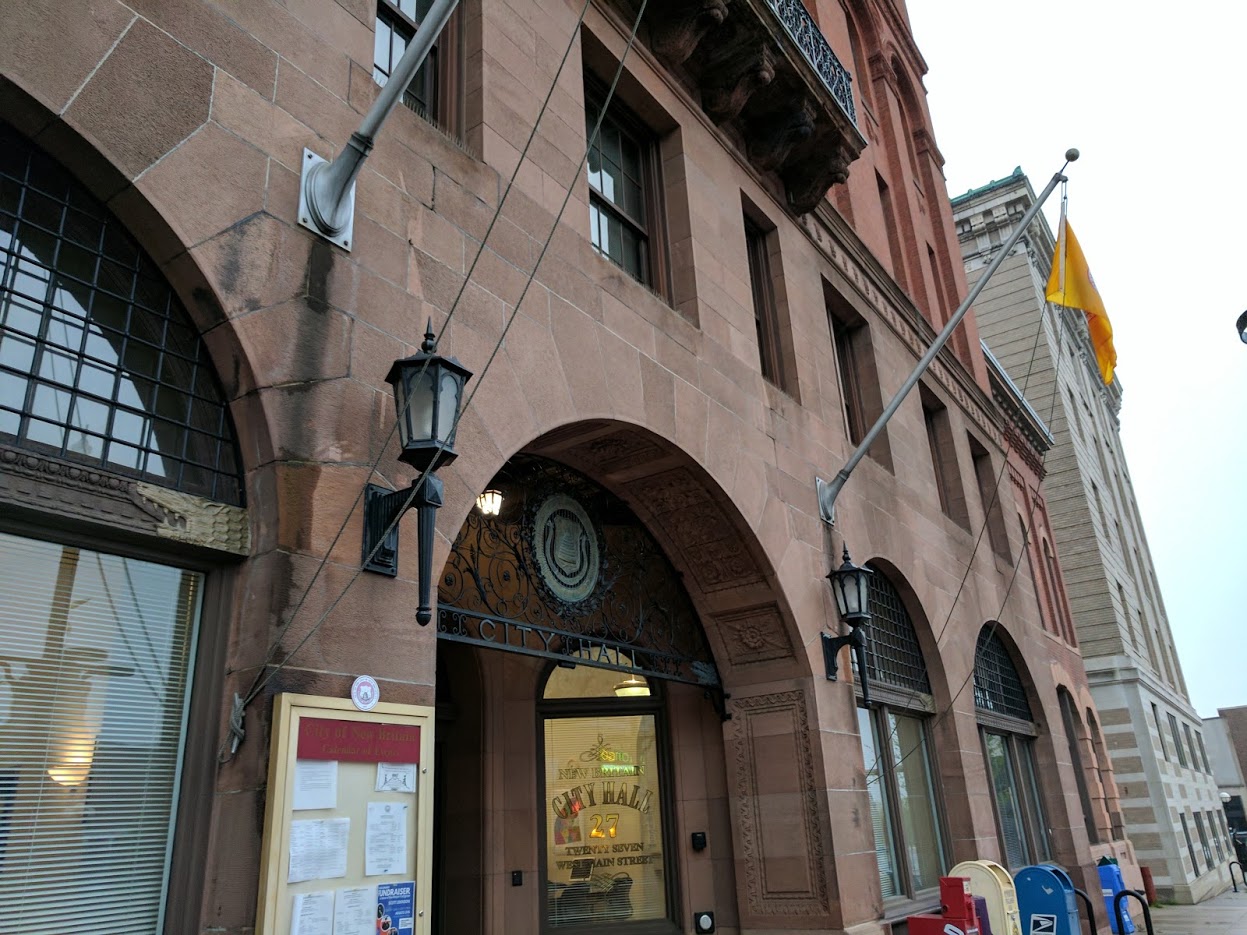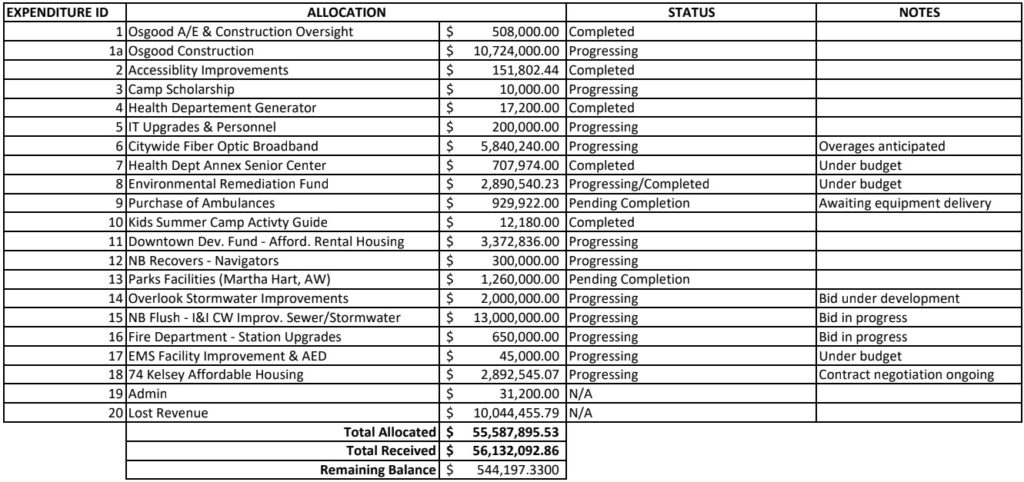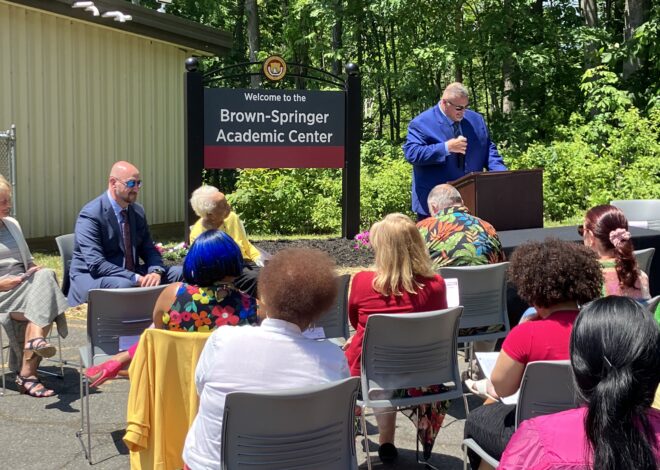
City Report on Federal COVID Recovery Funding Does Not Show How Much Unspent
A report from the city on its use of federal COVID relief funds so far appears to leave out an important item requested by the City Council — what the balances are of the money provided to the city.
The report from the city, provided to Council Majority Leader, Ald. John McNamara (D-4), does not show the amount still unspent, but does appear to show $544,197 of the funds as unallocated. While the $544,197 is referred to as “remaining balance”, it appears to actually be the unallocated amount, rather than the amount unspent, since it matches the difference between the reported “total received” and “total allocated”.
The city report also lists most of the funded items as “progressing” rather than “complete,” with some items noted as awaiting bidding or negotiation, further indicating that far larger than $544,197 is unspent.
New Britain was allocated $56,132,092 through the federal American Rescue Plan Act (ARPA), the 2021 Biden Administration law intended to help communities recover from the pandemic and subsequent economic hardships of residents and businesses. The total includes $42,050,789 in direct federal aid and another $14,081,304 in state pass-through money.

The information in the recent report from the city to the Council is similar to a report from the autumn of 2023. It does show some evolution of the city’s funding priorities since reporting done in 2022.
The recent report to the Council shows $10,044,455.79 reported under the “lost revenue” category that apparently allows governments to use the COVID relief funds for their own budgets. In a separate federal report on ARPA funding, the city of New Britain reported money in the “lost revenue” category as to be used for, “Medical Self Insurance Costs for the City of New Britain.”
The city budget shows $6,000,000 booked in the city’s General Fund in the 2023 budget year and another $3,154,455 budgeted for the current, 2024, budget year. That total, $9,154,455, is $890,001 short of the $10 million in the most recent city report to the Council.
Overall, reports on the city of New Britain’s use of the COVID relief funding show that a litany of the most significant construction projects and programs touted by Mayor Erin Stewart (R) over the past several years, including management of the city budget, have been made possible by use of the federal COVID relief funds.
The largest of these is the reported $11,232,000 for Osgood Park improvements. The city reported the purpose of this to the federal government as, “The creation of an outdoor classroom and activity space. The project site will service the low/mod census blocks on the north western side of the City of New Britain (416600,416700) and will be available for utilization by the Consolidated School District of New Britain in the event of in-person class cancellation.”
Overall, reports on the city of New Britain’s use of the COVID relief funding show that a litany of the most significant construction projects and programs touted by Mayor Erin Stewart (R) over the past several years, including management of the city budget, have been made possible by use of the federal COVID relief funds.
Another $1,260,000 is for Martha Hart and AW Stanley park improvements. The two parks are situated close to more prosperous sections of the city and far from the lowest income sections.
A $1.2 million line appears in the city’s federal COVID relief reporting, which the city called, “Municipal Youth Recreation and Childcare Centers,” and justified it by saying that, “The City will improve two recreational assets utilized for youth programming. Programing includes summer camps and after school educational programs. Youth from qualified low-moderate income families will be provided with scholarships for free entry to programming at ARPA-assisted facilities.”
Other major funded projects included in the city report to the Council included the “NB Flush” program for $13 million, $5,840,240 for the “Citywide Fiber Optic Broadband” program, $2.89 million for the demolition of the former Thomas Aquinas High School on Kelsey Street and a $2.89 million “Environmental Remediation Fund.” The use of the “Environmental Remediation Fund” is not broken down in the city’s report to the Council.
The city’s report does explicitly allocate $3,372,836 for, “Downtown Dev. Fund – Afford. Rental Housing,” though it does not break down what how that money has or is being spent. The topic of “affordable” housing subsidies, including tax breaks provided to developers by the city, has been controversial, with some accusing the city and developers of gentrification and Council Democrats struggling with Stewart to obtain information about the city’s tax subsidy deals.
Broadly speaking, cities and towns have been permitted use ARPA funds, according to the U.S. Treasury, to “fight the pandemic and support families and businesses struggling with its public health and economic impacts, maintain vital public services, even amid declines in revenue resulting from the crisis, build a strong, resilient, and equitable recovery by making investments that support long-term growth and opportunity.”



